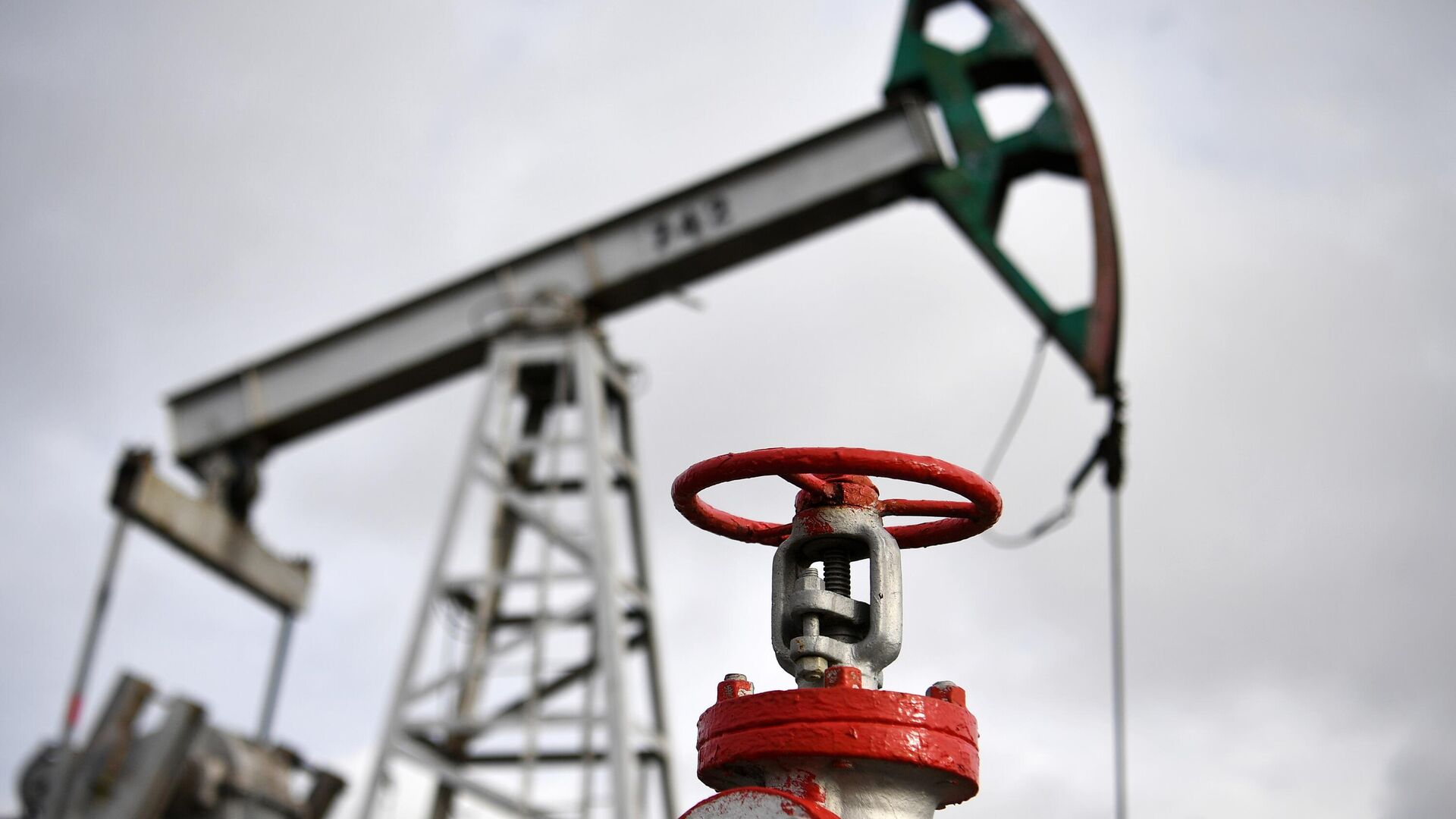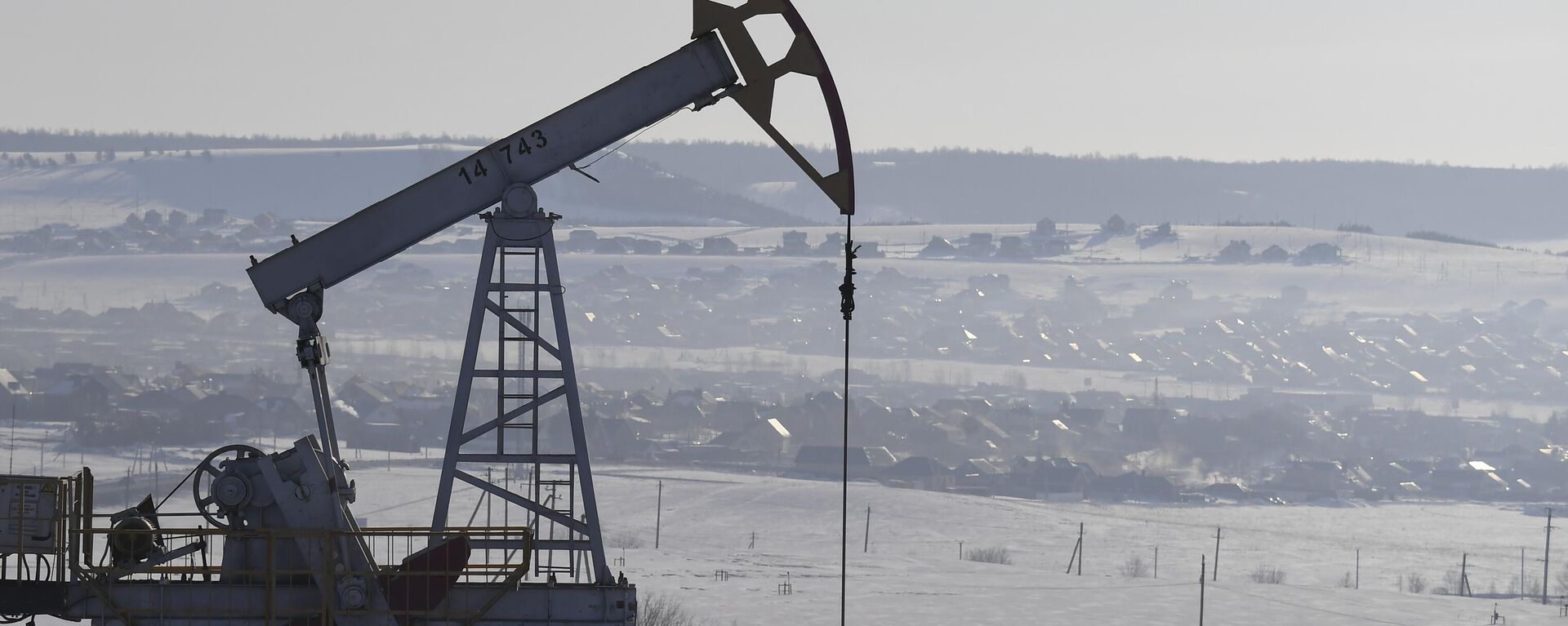https://en.sputniknews.africa/20230603/1059696584.html
OPEC+ May Decide on Hefty New Oil Cuts
OPEC+ May Decide on Hefty New Oil Cuts
Sputnik Africa
OPEC+ has launched talks that may wrap up with a decision on further oil production cuts of as much as one million barrels per day (bpd), a UK media outlet has claimed, citing unnamed sources as saying.
2023-06-03T16:45+0200
2023-06-03T16:45+0200
2023-08-03T10:49+0200
organization of petroleum exporting countries (opec)
russia
iraq
saudi arabia
united arab emirates
opec+
international
https://cdn1.img.sputniknews.africa/img/07e7/06/03/1059696947_0:181:2997:1867_1920x0_80_0_0_6834db866d523eb670b1d94940299021.jpg
OPEC+ has launched talks that may wrap up with a decision on further oil production cuts of as much as one million barrels per day (bpd), a UK media outlet has claimed, citing unnamed sources as saying. The issue is expected to top the agenda of the oil cartel’s talks scheduled for Sunday in Vienna.When asked about a possible one million bpd reduction, Iraq's Oil Minister Hayan Abdel-Ghani told reporters, "This number is premature, we didn’t go into these things [yet]."United Arab Emirates Energy Minister Suhail Al Mazroui, for his part, stressed that OPEC+ members "look forward to a resolution that will secure sustainability of balance of supply and demand."The OPEC+ talks come after Russian Deputy Prime Minister Alexander Novak insisted in late April that Russia sees no need to deepen OPEC+ production cuts due to slower-than-expected demand growth in China and lower oil prices.When asked by how much the current recovery in oil demand in China is slower than OPEC+ experts believed, he said that the recovery is underway and that the process may be going slower than expected.Novak earlier suggested that other OPEC+ member states may later join additional cuts in oil production announced by some members in April if they deem it necessary for the stabilization of the market.This comes after several OPEC+ countries signaled on April 3 that they plan to carry out a production cut of 1.5 million barrels daily that would add to earlier reductions of 2million bpd since November 2022. The combined 3.7 million barrels per day would remove about 3% of global oil supply.OPEC+ includes major non-member oil producers which agree on supply agreements and other arrangements aimed at keeping global oil prices and supplies stable. Among its members are Azerbaijan, Bahrain, Brunei, Kazakhstan, Malaysia, Mexico, Oman, the Philippines, Russia and Sudan.OPEC's 13 members comprise Algeria, Angola, the Republic of the Congo, Equatorial Guinea, Gabon, Iran, Iraq, Kuwait, Libya, Nigeria, Saudi Arabia, the UAE, and Venezuela, with the Saudis serving as the oil cartel’s de facto leader.
https://en.sputniknews.africa/20230516/1059290895.html
russia
iraq
saudi arabia
united arab emirates
Sputnik Africa
feedback@sputniknews.com
+74956456601
MIA „Rossiya Segodnya“
2023
Sputnik Africa
feedback@sputniknews.com
+74956456601
MIA „Rossiya Segodnya“
News
en_EN
Sputnik Africa
feedback@sputniknews.com
+74956456601
MIA „Rossiya Segodnya“
Sputnik Africa
feedback@sputniknews.com
+74956456601
MIA „Rossiya Segodnya“
opec+, launched talks, oil production, oil production cuts, organization of the petroleum exporting countries, iraq's oil minister, hayan abdel-ghani, united arab emirates, energy minister, suhail al mazroui, opec+ members, russian deputy prime minister, alexander novak
opec+, launched talks, oil production, oil production cuts, organization of the petroleum exporting countries, iraq's oil minister, hayan abdel-ghani, united arab emirates, energy minister, suhail al mazroui, opec+ members, russian deputy prime minister, alexander novak
OPEC+ May Decide on Hefty New Oil Cuts
16:45 03.06.2023 (Updated: 10:49 03.08.2023) The Organization of Petroleum Exporting Countries and its allies, led by Russia, which pump around 40% of the world's crude, decided to cut oil production in April from May to the end of this year to ensure the global energy market's stability.
OPEC+ has launched talks that may
wrap up with a decision on further oil production cuts of as much as
one million barrels per day (bpd), a UK media outlet has claimed, citing unnamed sources as saying. The issue is expected to top the agenda of the oil cartel’s talks scheduled for Sunday in Vienna.
When
asked about a possible one million bpd reduction, Iraq's Oil Minister Hayan Abdel-Ghani told reporters, "This number is premature, we didn’t go into these things [yet]."
United Arab Emirates Energy Minister Suhail Al Mazroui, for his part, stressed that OPEC+ members "look forward to a resolution that will secure sustainability of balance of supply and demand."
The OPEC+ talks come after Russian Deputy Prime Minister Alexander Novak insisted in late April that Russia sees no need to deepen OPEC+ production cuts due to slower-than-expected demand growth in China and lower oil prices.
"Of course, there is not [any need to cut oil production once again within OPEC+]. Because we only made a decision a month ago, and it will come into force from May for those countries that have joined. And this, I think, will be a good help if balance is not in favor of supply and demand,” Novak told reporters.
When asked by how much the current recovery in oil demand in China is slower than OPEC+ experts believed, he said that the recovery is underway and that the process may be going slower than expected.
Novak earlier
suggested that other OPEC+ member states may later join additional cuts in oil production announced by some members in April if they deem it necessary for the stabilization of the market.
This comes after several OPEC+ countries signaled on April 3 that they plan to carry out a production cut of 1.5 million barrels daily that would add to earlier reductions of 2million bpd since November 2022. The combined 3.7 million barrels per day would remove about 3% of global oil supply.
OPEC+
includes major non-member oil producers which agree on supply agreements and other arrangements aimed at keeping global oil prices and supplies stable. Among its members are Azerbaijan, Bahrain, Brunei, Kazakhstan, Malaysia, Mexico, Oman, the Philippines, Russia and Sudan.
OPEC's 13 members comprise Algeria, Angola, the Republic of the Congo, Equatorial Guinea, Gabon, Iran, Iraq, Kuwait, Libya, Nigeria, Saudi Arabia, the UAE, and Venezuela, with the Saudis serving as the oil cartel’s de facto leader.


